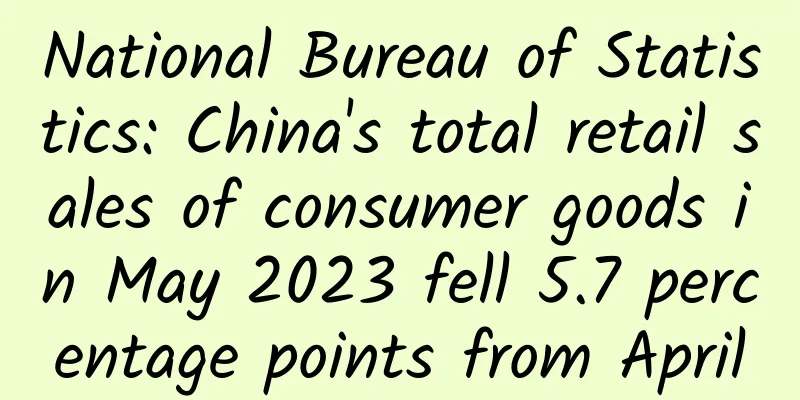National Bureau of Statistics: China's total retail sales of consumer goods in May 2023 fell 5.7 percentage points from April

|
"The largest investment in history", "the largest investment in the entire industry"... During this year's 618 Shopping Festival, Taobao Tmall, JD.com, and Kuaishou all shouted out the above "extreme" slogans, trying their best to prove to the outside world their determination and investment strength. This attitude has also been felt by the industry’s upstream and downstream. On the merchant side, a marketing manager of a new beauty consumer brand said: “(The platform’s) requirements for merchants to offer more preferential treatment are getting higher.” On the talent side, Li Muren, vice president of the talent live-streaming brand “Make Friends”, felt that “this year is indeed the most competitive year in the past. This competition is not only reflected in the competition for traffic (by brands), but also in the competition for traffic by platforms.” The background behind this is that, on the one hand, this is the first shopping festival after the epidemic. "Everyone really needs a consumption stimulus and a certain growth." On the other hand, this 618 is also the first shopping festival after Alibaba and JD.com changed their leadership and adjusted their organizational structure. "Although it is chaotic, it is of great significance for organizational integration and testing the waters in the second half of the year." Represented by 618 and Double 11, e-commerce shopping festivals with "Chinese characteristics" in the consumer market have been around for more than a decade, but have begun to show signs of fatigue a few years ago. Platforms leverage merchants to subsidize users, and the battle for the hearts and minds of people around low prices continues. But this year, we observed a clear difference: Giants from the "pre-e-commerce era" represented by Alibaba and JD.com have begun to focus on supporting small and medium-sized businesses and strengthening ecological operations under the premise of sluggish growth - that is, focusing on longer-term and sustainable operations. They will realize earlier than new stars in the "post-e-commerce era" such as TikTok that "without the skin, the hair will fall off" - under the premise that consumer confidence in the macro market tends to be conservative, the situation in which platforms subsidize consumers and drive growth by forcefully squeezing out the interests of merchants will not last long. From this perspective, this year's 618 may be the beginning of a return to "calmness". 01. The first shopping festival after the platform changed its leadership - cold and chaotic, but very important "Everyone needs a certain growth" E-commerce analyst Li Chengdong clearly felt that this year's 618, the industry's attention and discussion were not as high. In the e-commerce community he initiated and operated, hundreds of founders and executives of new consumer brands were more enthusiastic about discussing new energy vehicles than 618. Compared to ten years ago, when everyone had to stay up late to check the data of the shopping festival, compete for the sales rankings of the shopping festival, and publish battle reports, this year's 618 can be described as "deserted". However, as a shopping festival that is still important, "merchants and brands will still participate, but they are more passive participants." In recent years, with the rise of Pinduoduo and Douyin, the new e-commerce era has been established, and one of the major signs is the continued rise in traffic prices. Under the background of the two major platforms shouting "Everyday 618, Every Day Double 11", the significance of shopping festivals such as 618 (including Double 11) as low-price festivals is being diluted. Merchants are tired of shopping festivals because they are constantly asked to lower prices by platforms such as Pinduoduo and Douyin. After communicating with the founders of more than a dozen new consumer brands, Li Chengdong found that: "Douyin is too powerful in harvesting merchants, and the traffic cost is too high. Everyone complains about not making money and suffering huge losses. To put it bluntly, brands are no longer willing to spend so much money." Behind all this is the calmness of the macro market and the conservatism and caution of consumers. According to the data from the National Bureau of Statistics, in May, the growth rate of total retail sales of consumer goods in my country fell by 5.7 percentage points compared with April. A unique data is that according to the 618 pre-sale data as of 24:00 on May 28 this year (from Magic Mirror Market Intelligence), in the beauty and skin care category, the affordable domestic brand PROYA surpassed the dominating L'Oreal and Lancome to rank first. In Ni's opinion, skin care products, as non-essential products, can reflect consumer confidence to a certain extent. "People's exquisite skin care is a sign of market prosperity, and vice versa." "This is already a proposition that goes beyond the e-commerce industry," said Uncle Ni. In this context, merchants will be more cautious and conduct promotions while carefully controlling profits. However, he stressed that this 618 is still very important because it is the first shopping festival after Alibaba and JD changed their leadership and adjusted their organizational structure, and its greater significance lies in the team running-in and testing the waters in the second half of the year. An Alibaba Taobao Group insider told GeekPark that the 618 shopping event was a “chaotic one” for Alibaba. In March this year, Alibaba made the largest organizational restructuring in history, “1+6+N”, setting up six sub-groups and N independent businesses under the Alibaba Group. In April, Taobao Tmall Group officially operated independently according to the new structure, with Dai Shan (nicknamed Su Quan, known as MM within Alibaba) as the president, who has been in office for nearly a year. "MM is different from the traditional boss image. She is like a Taobao super consumer who spends a lot of time on Taobao. The Taobao Group will be very different under her tenure." said the above person. In April, JD.com also ushered in the biggest organizational restructuring in five years. In the restructuring, JD.com returned from the business group system to the business unit system, and for the first time connected the self-operated and POP (third-party store opening) businesses to achieve "equal rights" for traffic. In May, JD.com announced that Xu Lei stepped down as CEO, and former JD.com CFO Xu Ran took over as CEO. JD.com founder Liu Qiangdong is believed to be returning to the front line. The dramatic personnel changes also directly affected this year's 618 business. A person familiar with JD.com told Geek Park that a brand once invited JD.com management to participate in an event during 618, but their identities changed after the event. "This year's 618 is an adjustment period for JD.com, which may affect its performance," said the person. The following is GeekPark’s inventory of the 618 Shopping Festival investments of major e-commerce platforms: Alibaba Taotian Group Period: The "Taobao Good Price Festival" lasts for 10 days from June 4 to June 13. Consumer discounts: The "Taobao Good Price Festival" mainly includes two discount activities: official instant discounts and surprise red envelopes. "Official instant discounts" means that the discount rate of goods from merchants participating in the Good Price Festival is at least 10%, which can be superimposed with store discounts, etc. Mu Shan, the general manager of Taobao Tmall 618, said, "The 2023 Taobao Tmall 618 will be the 618 with the greatest consumer benefits in history." Merchant discounts: According to Tmall Toutiao WeChat official account, Taobao Tmall 618 merchant management strategy includes "6 major measures", including 2 billion advertising subsidies. Taobao Tmall small and medium-sized merchants who complete store management tasks can get up to 1,000 yuan of traffic coupons, and content-based merchants who complete content incentive tasks on this basis can get an additional 1,000 yuan of traffic coupons. Strategic focus: low prices; supporting small and medium-sized businesses; tapping into private domain traffic; focusing on content e-commerce; JD.com Period: Pre-sale starts at 8 pm on May 23, and full sale starts at 8 pm on May 31. Consumer discounts: On top of the direct price cuts for all items, users will have the opportunity to receive three "20 off for every 200" coupons every day. During the 618 period, the number of products that JD.com will be subsidizing will be more than 10 times that of March. During the promotion period, if merchants want to put the "618" label on their products, the price of the products must be lower than the transaction price in the past 30 days. Merchant discounts: This year's JD.com 618 saw the largest number of online and offline participating brands. We increased investment in all merchants by 20%, helping them reduce their operating costs by an average of 30%. Other highlights: On May 30, JD Live and “Make Friends” announced a strategic partnership. During JD 618, in addition to daily live broadcasts, “Make Friends” will work with Luo Yonghao to bring three live broadcasts on May 31, June 3, and June 17. Strategic focus: low prices; support for small and medium-sized businesses; focus on content e-commerce; Pinduoduo Period: From 10:00 pm on May 30 to 24:00 pm on June 3, Pinduoduo’s “618 Good Start”. From 20:00 on June 15 to 24:00 on June 18, “618 Special Event”. Consumer discounts: Pinduoduo's "618 Opening Red" will issue 5 billion coupons in succession, with each person receiving up to 500 yuan. "618 Special Event" will issue 10 billion coupons in succession, with each person receiving up to 290 yuan. Mobile phones and digital products are still the focus of this subsidy. Strategic focus: low prices; “every day is 618”; Tik Tok Period: 618 pre-sale starts on May 25, consumers pay deposits until 23:00 on May 30, and the balance payment period is from May 31 to June 2. Consumer discounts: The pre-sale area has vouchers of various denominations, such as 10 off for purchases over 100, 30 off for purchases over 300, and 100 off for purchases over 1,000. Strategic focus: low prices; increase supply from small and medium-sized businesses; increase the proportion of shelf e-commerce; quick worker Period: Business registration will start on May 9, the platform pre-sale period will be from May 18 to May 31, and the official activity period will be from June 1 to June 18. Consumer benefits: Invest 10 billion in platform traffic and 1 billion in product subsidies. Strategic focus: low prices; sorting out the relationship between influencers and merchants; continuing to focus on content e-commerce; increasing the proportion of shelf e-commerce; Little Red Book Cycle: May 8th to May 23rd is the water storage and grass planting period, May 24th to May 31st is the preheating and purchase period, June 1st to June 18th is the outbreak conversion period, and after June 19th is the return continuation period. Consumer discounts: Inflation red envelopes, search rewards, deposit pre-sales, hot product flash sales, cross-store discounts, etc. Inflation red envelopes can be expanded to 100 yuan. For every 300-50 yuan spent across all platforms and stores, additional inflation red envelopes can be added. Merchant discounts: Merchants who link products registered for the event and publish product notes will receive traffic on the homepage of Xiaohongshu. A single product note can receive up to 200,000 exposure incentives. A single merchant can enjoy up to 2 million exposures during the event. Strategic focus: low price; content e-commerce;
02. Capital market’s attention to e-commerce and shopping festivals is waning. “The era of pursuing GMV is over.” Let’s go back to the source in 2009. In that year, the not-so-famous Taobao Mall wanted to stimulate sales by planning a promotional event. “Singles’ Day” became the chosen gimmick. In the end, an advertising budget of 10,000 yuan and 27 participating brands inadvertently kicked off the rise in consumption data - from 936 million yuan in sales in 2010, it climbed year by year to 3.36 billion yuan, 19.1 billion, 35 billion... and then climbed to over 100 billion. "Ali was the first to realize that as supply began to become abundant or even excessive, the promotions of the Suning era (Note: Suning held the first O2O shopping festival in 2013 to block Tmall's "Double Eleven") could no longer attract public attention. Therefore, Ali launched the Double 11 Shopping Festival and Tmall Gala, using entertainment methods to focus social attention and promote big sales." Uncle Ni told Geek Park. The turning point worth mentioning was in 2012. If we say that the previous Double 11 and 618 were just internal carnivals within the e-commerce industry, in 2012, as JD.com and Alibaba began to prepare for listing, Tmall’s sales on Double 11 exceeded 10 billion yuan (19.1 billion yuan), surpassing the U.S. Cyber Monday for the first time and becoming the world’s largest online shopping festival. "In those days, the platforms had a lot of motivation to invest in shopping festivals," said Li Chengdong, who has worked in the e-commerce departments of Tencent and JD.com. At that time, the valuation of e-commerce platforms was close to 3 times PS (book valuation calculated based on three times the transaction amount). Shopping festivals drove the growth of sales, providing a strong guide for the increase in listing valuations. The sufficient motivation of the platforms also led to the participation of mainstream brands. "In those years, it was almost the whole nation's attention." The sales boost mainly relies on brand merchants. Uncle Ni has been at Alibaba for 7 years and has personally experienced the Double 11 frenzy. He described that the secret to increasing sales internally at that time was to "let big brands stock up more." "For example, what if the performance is to reach 10 billion? Then let Uniqlo stock up 10 billion more goods. Because as long as these big brands offer discounts, they can sell as much as they have in stock, and they are the ones who support the data." The carnival continued until 2018, when the shopping festivals on domestic e-commerce platforms finally reached a bottleneck period. At the same time, the rise of Pinduoduo brought about the normalization of low-price promotions, further consolidating the low-price consumption mentality of Chinese people and increasing the difficulty of shopping festivals such as 618. On the one hand, brands’ enthusiasm is fading: over the years, brands’ heavy subsidies during shopping festivals and return issues have caused many brands to re-examine the ROI of this war; on the other hand, consumers’ expectations for discounts are constantly being raised: once platforms and brands reduce subsidies, the carnival magic of shopping festivals will become ineffective. More importantly, the capital market's attention to e-commerce and shopping festivals is receding. In 2019, several major signals cast a wintering atmosphere over the industry: first, the growth rate of e-commerce began to slow down and traffic peaked. After that, the COVID-19 pandemic began and lasted for three years, changing the confidence of the capital market. In the process, the regulatory penalty against Alibaba's "choose one of two" and a series of new Internet regulatory regulations switched the platform's previous narrative of rapid development to another mode: seeking change in "stock" - scale and GMV are no longer the first narrative, but growth must be achieved through profitability. But in the eyes of industry insiders, on the surface, platforms, merchants and consumers are all returning to calm, but in fact, the shopping festival has simply returned to where it should be. Uncle Ni pointed out that the special significance of 618 and Double 11 is to seize the demand of consumers for seasonal changes and release the demand all at once. In this process, platforms and merchants can have the opportunity to concentrate on stocking and publicity to reduce costs, and increase sales to boost their own and market confidence. Of course, this is an ideal environment in theory, but Uncle Ni believes that "merchants and platforms have the opportunity to achieve a win-win situation through shopping festivals." 03. Seeking change in “stock”: no longer using GMV as the only indicator, and increasing support for small and medium-sized businesses Against this backdrop, Alibaba is also making changes internally. On the one hand, Alibaba no longer regards GMV as the only baton, and gradually pays more attention to supporting small and medium-sized businesses. In April, after Taobao Tmall Group became independent, it established three industry development departments. Among them, the first department is led by Qigong (Wang Hai), mainly serving small and medium-sized businesses. The second department is led by Aowen (Liu Peng), mainly serving brand businesses. "Different departments have completely different batons. For example, the first department will emphasize GMV more, but the second department is different." said the above-mentioned Taobao Tiantian person. Take the clothing category as an example. This is the only category that is split into two departments. Among them, Tmall women's clothing is mostly brand merchants, mainly looking at GMV, so it is divided into the first department. Taobao women's clothing is mostly small and medium-sized merchants, who need to be supported, so it is divided into the second department. After Dai Shan came to power, one of the three major policies she proposed was "ecological prosperity", which means giving more small and medium-sized merchants development opportunities. On the other hand, compared with GMV growth, Alibaba began to emphasize the development of existing resources. "When GMV stopped growing, we began to emphasize private domain operations, that is, to let merchants do a good job of retention and repurchase, and increase the value of single users." The above-mentioned Taotian person said. During the 618 period, Alibaba set up a series of rules, stipulating that if merchants do a good job in private domain, they will be given free traffic. However, emphasizing private domains will reduce the motivation of merchants to buy advertisements, which affects Alibaba’s own cake and makes people doubt whether Alibaba has the motivation to do this. The above-mentioned Taotian person said, “The game within Alibaba is indeed very serious, but in the long run, this direction must be more important than GMV.” In the more than ten years since the birth of the shopping festival, it has created one Chinese consumer wonder after another that shocked the world. While raising the performance and stock prices of e-commerce platforms to unimaginable highs, it has also made countless merchants involved, experiencing success and disillusionment. Now, it is gradually returning to its original position - a real promotion, a concentrated outbreak of consumer demand at the season change point. In this promotion, platforms and merchants treat it rationally and do what they can, and will not "bleed" themselves in pursuit of an exaggerated number and hurt themselves. In fact, the e-commerce industry has been undergoing a round of evolution in its underlying logic in recent years. First, the past shopping entrance is gradually shifting to the mind entrance. In other words, the platform not only needs to provide goods, but also needs to influence the minds of users. And influencing the mind is closely related to good content, which is also the reason for the strong rise of content e-commerce such as Xiaohongshu and Douyin. At present, Alibaba is fully transforming to content e-commerce. According to Geek Park, the capabilities demonstrated by AIGC are being valued by Alibaba internally, and it is considering using it to create tools to serve merchants to create "the best e-commerce content" themselves. Perhaps this is why Dai Shan said in her speech, "The future e-commerce platform will also be the best content platform." Secondly, the key to consumption is shifting from brand trust to individual trust. As the supply of brands expands, it will be difficult for consumers to choose among tens of millions of products. The existence of Wei Ya and Li Jiaqi is to select one or several products from tens of millions of categories and win the trust of consumers and encourage them to buy them in bulk. In this round of evolution, the e-commerce industry is entering the "stock" era. On the one hand, the platform should strive to integrate the new underlying logic, and on the other hand, it should be aware of the essence of e-commerce - it is the "home" of merchants - if merchants cannot make money on the platform and cannot grow healthily, then the platform will also lose its value and competitiveness. This 618 is just the beginning, and we can observe an obvious distinction: Giants from the "pre-e-commerce era" represented by Alibaba and JD.com have begun to focus on supporting small and medium-sized businesses and strengthening ecological operations under the premise of sluggish growth - that is, focusing on longer-term and sustainable operations. They will realize earlier than new stars in the "post-e-commerce era" such as TikTok that "without the skin, the hair will fall off" - under the premise that consumer confidence in the macro market tends to be conservative, the situation in which platforms subsidize consumers and drive growth by forcefully squeezing out the interests of merchants will not last long. From this perspective, this year's 618 may be the beginning of a return to "calmness". From Geek Park |
<<: State Post Bureau: Statistical Communiqué on Postal Industry Development in 2022
>>: Survey shows only 7% of passengers use airport apps
Recommend
Drinking kale powder makes you thinner? Can acai berry powder make your skin whiter? Check out this article!
Author: Xue Qingxin, one of the first nutrition i...
The role of cod liver oil
The human body needs a lot of nutrients, so in da...
What are the effects of drinking water with astragalus and wolfberry?
Astragalus and wolfberry are both good Chinese he...
Gynostemma pentaphyllum
Gynostemma pentaphyllum leaf is a common Chinese ...
Tmall: A total of 402 brands will have sales exceeding 100 million yuan on Double 11 in 2023
Tmall Double 11 2023 ended. Official data showed ...
Effects of Amoxicillin Capsules
In fact, in people's lives, they often do not...
The efficacy and function of sweet tea
The medical value of sweet tea is beyond our imag...
Does Sanqi Danshen Tablet have any side effects?
The efficacy of Panax notoginseng and Danshen tab...
The luxurious "birthing room" for fish on the seabed is 150 times the size of Beijing
Recently, scientists' research objects seem t...
Watermelon Frost Lozenges
Watermelon frost lozenges? Watermelon frost is a ...
The efficacy and function of Gaoshanwang
As a traditional Chinese medicinal material, Gao ...
The difference between mugwort and wormwood
In our daily life, there are many plants that loo...
The efficacy and function of the root of the Chinese thorn
Traditional Chinese medicine is a Chinese traditi...
Why is Seahorse Dad called "the best husband in the animal world"?
Every spring, many animals start preparing for re...
If you suddenly grow "little wings" in your eyes, be careful, this is a pterygium eye disease!
Doctor, I have "little wings" growing i...









